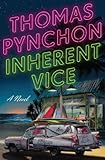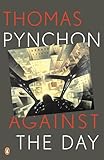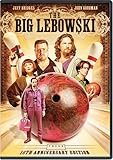 When publishing industry stool-pigeons started whispering last fall that Thomas Pynchon‘s latest would be a detective novel, I couldn’t see what the fuss was about. By my count, he’d already written four. From Hubert Stencil and the Case of the Missing V. to Tryone Slothrop and the V-2 Syndrome, Pynchon has, like Dickens and Dostoevsky before him, often used the form of the mystery-story to structure his loose, baggy monsters. The difference – and it is pretty much the difference between modernity and postmodernity – is that where Bleak House and The Brothers Karamazov tend toward solutions, Pynchon’s mysteries only ramify into further mysteries.
When publishing industry stool-pigeons started whispering last fall that Thomas Pynchon‘s latest would be a detective novel, I couldn’t see what the fuss was about. By my count, he’d already written four. From Hubert Stencil and the Case of the Missing V. to Tryone Slothrop and the V-2 Syndrome, Pynchon has, like Dickens and Dostoevsky before him, often used the form of the mystery-story to structure his loose, baggy monsters. The difference – and it is pretty much the difference between modernity and postmodernity – is that where Bleak House and The Brothers Karamazov tend toward solutions, Pynchon’s mysteries only ramify into further mysteries.
What is actually novel, then, about Pynchon’s new novel? Well for one thing, Inherent Vice gives us a protagonist who is even more apt than its author to digress, to space out, to lose the thread: a pint-sized pothead and sometime gumshoe named Larry “Doc” Sportello. (Don’t ask.) Becalmed, circa 1970, in the surf community of Gordita Beach, Cal., Doc ekes out just enough money as the proprietor of LSD Investigations to keep himself stoned. (LSD, naturally, “standing for ‘Location, Surveillance, Detection.'”) When his ex-squeeze tips him off to a plot to kidnap her new old man, Doc finds himself drawn into an underworld where real-estate moguls, neo-Nazis, and dentists conspire to…uh…do something or other. Or is it when black nationalist Tariq Khalil shows up? Or when surf-rock saxophonist Coy Harlingen goes missing? Oh, who cares, man? Pass me an E-Z Wide and cue The Boards.
Inherent Vice is at its best when (like this trailer, narrated by Pynchon himself) it hews to the half-baked perspective of its hero – when it uses its Raymond Chandler-ish plot as a kind of excuse for its set pieces. Nor are these set pieces merely ornamental. My favorites – the lost empire of Lemuria (“The Atlantis of the Pacific”); visits to any number of greasy spoons; Doc’s acid trip – adumbrate the novel’s moral vision, to the extent that it has one. Here, as elsewhere, Pynchon is on the side of the Preterite. Witness, for example, Doc’s side-trip to Vegas:
According to Tito, the Kismet, built just after WWII, had represented something of a gamble that the city of North Las Vegas was about to be the wave of the future. Instead, everything moved southward, and Las Vegas Boulevard South entered legend as the strip, and places like the Kismet languished. Heading up North Las Vegas Boulevard, away from the unremitting storm of light, episodes of darkness began to occur at last, like night breezes off the desert. Parked trailers and little lumberyards and air-conditioning shops went drifting by.
Also new in Inherent Vice is the mellow bittersweetness that shades the last couple of sentences, the benign half-grin with which much of the book is put across. For great stretches, description retreats entirely, in favor of dialogue. Depending on the level of chemical enhancement, the results can be amusing, if inessential. “Why is there Chicken of the Sea,” one character muses, “but no Tuna of the Farm?” Pynchon has done hippies before, but rarely has his writing felt so loose.
Then again, this looseness, the book’s great innovation, is also the source of its most glaring weaknesses. Because Pynchon is pretty much making stuff up as he goes along, Inherent Vice falls apart whenever it attempts to actually generate suspense. (Presumably, there’s some play going on here with the byzantine conventions of film noir and the gaps in Doc’s memory, but outside of the work of David Foster Wallace, tedium is not a legitimate aesthetic effect.) To put it another way, the book is entertaining except when it isn’t.
Worse: with the exception of Doc and a couple of others, Pynchon half-asses his characters. Character has always been Pynchon’s weakness – too often people in his novels feel like mere linguistic events, conjunctions of syllables – but here the lack of any sense of life beyond the page makes it hard to keep track of who’s speaking, much less whodunit. In the time it takes to disentangle Riggs Warbling from Adrian Prussia, one forgets what the significance of either is supposed to be.

 As in 2006’s Against the Day, there are moments here that feel like Pynchon doing Pynchon. The songs, in particular, amount to parodies of parodies. (If you’ve ever wondered whether any of Pynchon’s songs had any aesthetic value, compare Inherent Vice‘s “Just the Lasagna” to anything in Gravity’s Rainbow.)
As in 2006’s Against the Day, there are moments here that feel like Pynchon doing Pynchon. The songs, in particular, amount to parodies of parodies. (If you’ve ever wondered whether any of Pynchon’s songs had any aesthetic value, compare Inherent Vice‘s “Just the Lasagna” to anything in Gravity’s Rainbow.)
The novel’s ideas have a recycled quality, too. In this case, though, a quality of obsession redeems them. Pynchon’s great subject has turned out to be not paranoia but history: specifically, those moments in it when the world might change, but doesn’t. If Against the Day amounted to a sprawling catalogue of such moments, Inherent Vice profitably limits itself to a specific instance – one Pynchon lived through. As the novel shambles toward its conclusion, a pedal-note of genuine loss builds:
Tito snored away on the other bed. Out there, all around them to the last fringes of occupancy, were . . . the Starship Enterprise, Hawaiian crime fantasies, cute kids in make-believe living rooms with invisible audiences to laugh at everything they did, baseball highlights, Vietnam footage, helicopter gunships and firefights, and midnight jokes, and talking celebrities, and a slave girl in a bottle, and Arnold the pig, and there was Doc, on the natch, caught in a low-level bummer he couldn’t find a way out of, about how the Psychedelic Sixties, this little parenthesis of light, might close after all, and all be lost, taken back into darkness…
The effect here is not nostalgia, which packages the past for bite-sized consumption, and so palliates our hunger for utopia. Rather, Pynchon seems to be trying to awaken us to the idea that things might become other than they are, by reaching back for the last time when Americans actually seemed to believe it – before, as Hunter S. Thompson wrote, the “high and beautiful wave” of the middle Sixties “finally broke and rolled back.”


 Ultimately – perhaps regrettably – Inherent Vice is a wash. Depending on your angle, it’s either a breezy Something that looks like an airy Nothing, or vice versa. Those looking for a brilliant cannabinoid caper should add The Big Lebowski, The Long Goodbye, or Pineapple Express to the Netflix queue post-haste. But those who believe (with the Buddhists and Yogi Berra) that if things were perfect, they wouldn’t be probably won’t regret a few hours spent in the company of…oh, crap, man. What’s the guy’s name again?
Ultimately – perhaps regrettably – Inherent Vice is a wash. Depending on your angle, it’s either a breezy Something that looks like an airy Nothing, or vice versa. Those looking for a brilliant cannabinoid caper should add The Big Lebowski, The Long Goodbye, or Pineapple Express to the Netflix queue post-haste. But those who believe (with the Buddhists and Yogi Berra) that if things were perfect, they wouldn’t be probably won’t regret a few hours spent in the company of…oh, crap, man. What’s the guy’s name again?








